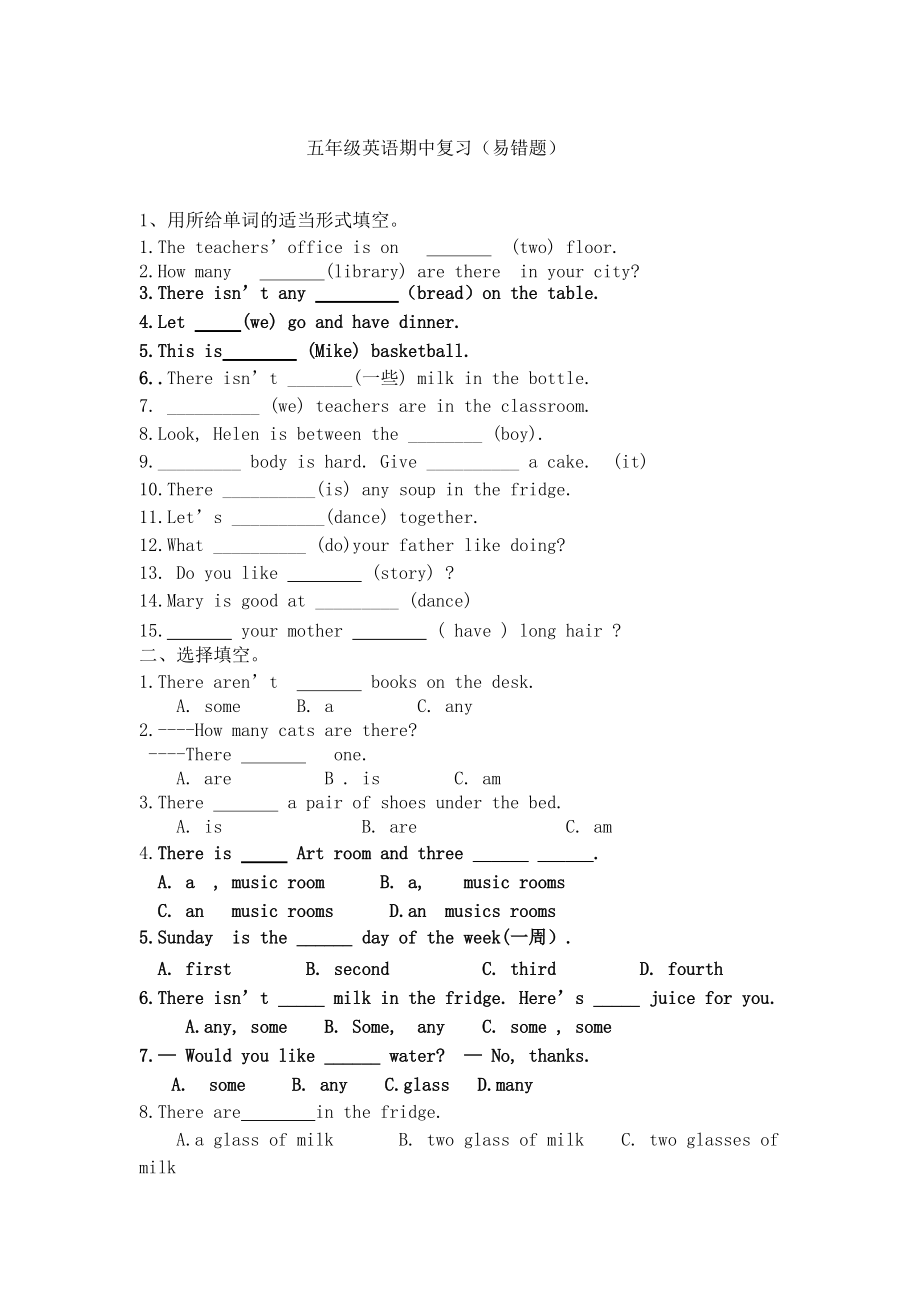《五年級(jí)上冊(cè)英語(yǔ)期中試題復(fù)習(xí)易錯(cuò)題牛津譯林》由會(huì)員分享���,可在線閱讀,更多相關(guān)《五年級(jí)上冊(cè)英語(yǔ)期中試題復(fù)習(xí)易錯(cuò)題牛津譯林(5頁(yè)珍藏版)》請(qǐng)?jiān)谘b配圖網(wǎng)上搜索�����。
1��、
五年級(jí)英語(yǔ)期中復(fù)習(xí)(易錯(cuò)題)
1�����、 用所給單詞的適當(dāng)形式填空����。
1.Theteachers’officeison (two)floor.
2.Howmany (library)arethere inyourcity?
3.There isn’t any (bread)on the table.
4.Let (we) go and have dinner.
5.This is (Mike) basketball.
6..There isn’t _______(一些) milk in the bo
2、ttle.
7. __________ (we) teachers are in the classroom.
8.Look, Helen is between the ________ (boy).
9._________ body is hard. Give __________ a cake. (it)
10.There __________(is) any soup in the fridge.
11.Let’s __________(dance) together.
12.What __________ (do)your father like doing?
13.
3���、Do you like (story) ?
14.Mary is good at _________ (dance)
15. your mother ( have ) long hair ?
二�、選擇填空�����。
1.There aren’t books on the desk.
A. some B. a C. any
2.----Howmanycatsarethere?
----There one.
A. are B. is C.am
4、
3.There a pair of shoes under the bed.
A. is B. are C. am
4.There is Art room and three ______ ______.
A. a,music room B. a,music rooms
C. anmusic rooms D.an musics rooms
5.Sunday is the ______ day of the week(一周).
A. first B. second C. third
5�、D. fourth
6.There isn’t _____ milk in the fridge. Here’s _____ juice for you.
A.any, some B. Some, any C. some , some
7.— Would you like ______ water? — No, thanks.
A. some B. any C.glass D.many
8.There are in the fridge.
A.a glass of milk B. two glass of m
6、ilk C. two glasses of milk
9.My father is very strict(嚴(yán)格). I am afraid of ________.
A. her B. him C. his
10.You can see _________ in Australia.
A. pandas B. kangaroos C. polar bears
11.Two dogs have __________legs.
A. four B. two C. eight
7�����、12.Tom has __________ animal friend.
A. a B. an C. some
13. What’s your hobby? My hobby is _________.
A. play football B. playing football C. playing the football
14.Are there four students near the music room?Yes,__________.
A.they are B.there are c.these are
15.N
8��、ancy likes singing. The twins like singing,too.They__________like singing.
A.both B.also C.all
16.You can see ___________ in Canada.
A. bald eagles B. polar bears C. kangroos
三�����、詞匯檢測(cè)�。
A)根據(jù)句意,在括號(hào)中選出最佳選項(xiàng)���,填在橫線上�����。
1 Don’t push___________(he/him)! It’s too high.
2 There is a r
9���、iver between the ___________(hill/hills).
3 Mike’s dog ________(have/has)eight legs.
4 Look,there is some _____________(hamburgers/bread) on the table.
5 Can you _____________(swim/swimming) in the river?
B)根據(jù)中文及句意����,寫(xiě)出所給單詞的正確形式��。
1 My brother can swim very_____________(好).
2 You are _________ (這
10���、么)heavy.
3 Elephants have big __________(身體).
4 The two pictures on the wall are ______________(都) beautiful.
5 The rabbit ___________(有) a short tail.
四�、按要求完成下列句子�����。
1..My sister has a parrot .(改為一般疑問(wèn)句���,并作肯定回答)
sister a parrot? Yes , she .
2.It has wings
11、 .(改為否定句)
It wings ?
3..Jim sits behind me. Tom sits in front of me.(改為同義句)
I __________ __________ Jim and Tom.
4.She can skate very well. (改為同義句)
She is __________ __________ skating.
5.I like playing the piano at home. (對(duì)劃線部分提問(wèn))
__________ do you like __________ at h
12����、ome?
五、看圖���,把下列對(duì)話補(bǔ)充完整�����。
A: can you see in the picture ?
B: I can see some on the farm.
A: How animals there
on the farm ?
B: five .
A: Look at the horse . It a
long tail . And the cow a
long one, too .
B:
13�、 a lovely dog on the
farm . It are big. Its ears are long. But its is short
A: I like them very much .
六、閱讀理解�����。
(Calvin is a new student in Peter’s class. He wants to know more(更多的) about his classmates(同學(xué)). Now Calvin and Peter are in the playground.)
Calvin:
14����、 Peter, who’s the boy under the tree?
Peter: Is the boy playing with a cat?
Calvin: Yes. And his jacket is brown.
Peter: Oh, he’s Gao Shan. He likes playing computer games(游戲). He has an iPod. It’s great!
Calvin: Oh, I see. Look, there are two boys over there. They are playing basketball. Who
15、are they?
Peter: They are my good friends. The tall one is Mike. The fat one is Bill. We all like playing basketball. What’s your hobby, Calvin?
Calvin: My hobby is playing football. I like playing basketball, too. Shall we go and play with them now?
Peter: Good idea. Let’s go.
Calvin: OK.
根據(jù)
16����、對(duì)話,選擇正確答案�。
( )1. _______ is a new student in Peter’s class.
A. Gao Shan B. Bill C. Calvin
( )2. Gao Shan is _______ under the tree.
A. playing computer games B. playing with a cat C. playing football
( )3. Mike and Bill both like _______.
A. playing computer
17、games B. playing basketball C. playing football
( )4. Can Calvin play basketball?
A. No, he can’t. B. Yes, he can. C. I don’t know.
( )5. Calvin wants to __________ with Peter.
A. play computer games B. play football C. play basketball
七��、看圖作文��。根據(jù)所給圖示����,用所給的句式完成一篇短文。至少寫(xiě)五句�。
提示語(yǔ):
18���、big/ small, long/ short, fat/ thin, black/ brown, peaches/ bananas
This is my animal friend.
It is ___________________________________.
______________________________________.
It has _________________________________.
______________________________________.
It can_____________________________
19、_____.
_______________________________________.
課本���、報(bào)刊雜志中的成語(yǔ)�、名言警句等俯首皆是,但學(xué)生寫(xiě)作文運(yùn)用到文章中的甚少,即使運(yùn)用也很難做到恰如其分����。為什么?還是沒(méi)有徹底“記死”的緣故。要解決這個(gè)問(wèn)題,方法很簡(jiǎn)單,每天花3-5分鐘左右的時(shí)間記一條成語(yǔ)�、一則名言警句即可�����?�?梢詫?xiě)在后黑板的“積累專欄”上每日一換,可以在每天課前的3分鐘讓學(xué)生輪流講解,也可讓學(xué)生個(gè)人搜集,每天往筆記本上抄寫(xiě),教師定期檢查等等�����。這樣,一年就可記300多條成語(yǔ)����、300多則名言警句,日積月累,終究會(huì)成為一筆不小的財(cái)富�。這些成語(yǔ)典故“貯藏”在學(xué)生腦
20���、中,自然會(huì)出口成章,寫(xiě)作時(shí)便會(huì)隨心所欲地“提取”出來(lái),使文章增色添輝��。
單靠“死”記還不行,還得“活”用,姑且稱之為“先死后活”吧��。讓學(xué)生把一周看到或聽(tīng)到的新鮮事記下來(lái),摒棄那些假話套話空話,寫(xiě)出自己的真情實(shí)感,篇幅可長(zhǎng)可短,并要求運(yùn)用積累的成語(yǔ)�、名言警句等,定期檢查點(diǎn)評(píng),選擇優(yōu)秀篇目在班里朗讀或展出��。這樣,即鞏固了所學(xué)的材料,又鍛煉了學(xué)生的寫(xiě)作能力,同時(shí)還培養(yǎng)了學(xué)生的觀察能力�、思維能力等等,達(dá)到“一石多鳥(niǎo)”的效果。
死記硬背是一種傳統(tǒng)的教學(xué)方式,在我國(guó)有悠久的歷史����。但隨著素質(zhì)教育的開(kāi)展,死記硬背被作為一種僵化的、阻礙學(xué)生能力發(fā)展的教學(xué)方式,漸漸為人們所摒棄;而另一方面,老師們又為提高學(xué)生的語(yǔ)文素養(yǎng)煞費(fèi)苦心�����。其實(shí),只要應(yīng)用得當(dāng),“死記硬背”與提高學(xué)生素質(zhì)并不矛盾�。相反,它恰是提高學(xué)生語(yǔ)文水平的重要前提和基礎(chǔ)。
 五年級(jí)上冊(cè)英語(yǔ)期中試題復(fù)習(xí)易錯(cuò)題牛津譯林
五年級(jí)上冊(cè)英語(yǔ)期中試題復(fù)習(xí)易錯(cuò)題牛津譯林

